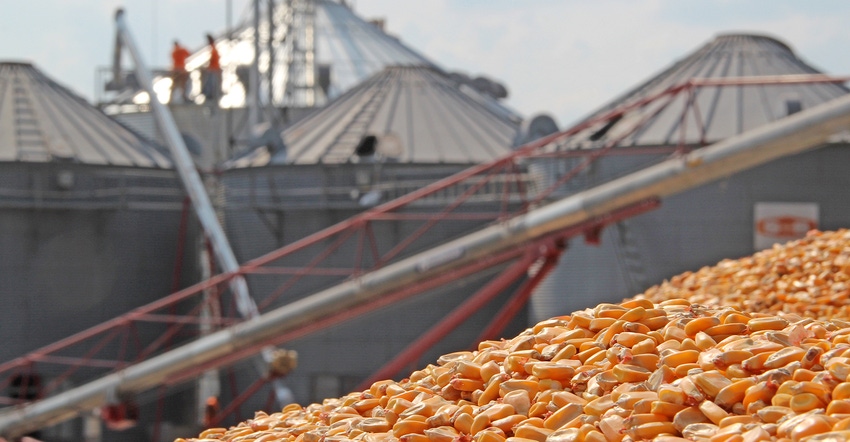
Lockout/tagout is a program and a procedure that is simple and saves lives, and it can be used on the family farm or in an industry setting.
During Stand Up 4 Grain Safety Week, Dave Newcomb, Ag Safety & Rescue Program Manager for Illinois Fire Services Institute, presented in a webinar how to use lockout/tagout to keep workers safe in and around grain bins.
"Lockout/tagout is so basic," Newcomb said. "It is affordable, and it absolutely makes a difference. Everybody can do it, and it is all about protecting our employees. Lockout/tagout makes a barrier using a lock, so a machine cannot be turned on. It is mandatory for commercial and non-exempt farmers, and it is a best practice."
Lockout/tagout may seem like a practice best used in a larger operation or industry setting, but what about the family farm?
"Say a father and son discuss needing to check the auger on a bin. Nobody thought about lockout/tagout," he said. "The father goes to check the auger the next day without mentioning it to his son and notices that something is not right. Meanwhile, the son decides to check the auger too and turns it on, and the father loses his forearm. A simple padlock would have saved the man's arm. Lockout/tagout is a small change, but it has a big impact."
Lockout
The first step according to Newcomb is that all workers are on the same page about how the process works.
"It could be something as simple as I did not have a lock with me, but if I had a heavy-duty zip tie and a piece of paper, I could make a lockout/tagout," Newcomb said.
This process protects against injury by protecting workers against unexpected startups during the service and maintenance of machinery.
"How common could it be for us if we are making a repair to shut the machinery off, go start our work, but not secure the machine?" he asked. "How possible is it that someone walks in and says, 'Hey, we're supposed to be unloading grain,' and they start flipping switches and injuries occur because it was not secured?"
Lockout/tagout controls the possibility of hazardous injury by isolating the power sources.
"When working in grain especially, our first goal in lockout/tagout is to make the grain static," Newcomb said. "We do not want things moving. We can use this method to de-energize machines, using isolation devices. A lockout is defined as the isolation of energy from the system or machine, which physically locks the system in a safe mode, preventing energy from getting to it.
"If I disconnect the electricity and I lock it, I have prevented the electricity from energizing that equipment to make it move."
Tagout
Tags with warning labels simply tell workers why there is a lock on the machine.
"It can say, 'Do not operate,' but the whole point is to get a person's attention, so something cannot be accidentally turned back on when a person is in a dangerous situation," Newcomb said. "It also says who did the lockout on the tag, so if several employees are working on a job, everyone can be accounted for.
"We also work under the auspice of one lock, one key, one person. If I am locking out, I have secured the machine, and nobody else can unlock the padlock except for me."
Tags are also a way to account for people on the job because a machine cannot be started until everyone comes back to unlock it, and each tag has the person's name.
"I come from the rescuer side of this, but if I have multiple people on the job working in a bin or around machinery, there are going to be as many locks as people," he said. "The machinery will not get reactivated until all of the people are back and accounted for."
When is it necessary?
This practice is useful when doing service or maintenance on equipment.
"Occasionally, machines break down, or they have to be taken care of for proper maintenance," Newcomb said. "When we must do maintenance, we do lockout/tagout. We shut the machinery off and lock it out.
"If I had to put any part of my body in a position where it could come in contact with pieces that can move so an entanglement is possible, lockout/tagout works, especially in grain bin entry. If we are going in, we are going to lockout/tagout because our first goal is to make the grain stable, so the machinery cannot accidentally be turned on and make the grain move and get people into danger."
To perform a lockout/tagout, identify the energy sources, notify everyone who may be affected by the machines being turned off, and face away from the machinery when shutting down the equipment as well as when you are turning it back on. Bleed air pressure off a tank from a system that is run by air pressure to take the air pressure off, which stabilizes and locks the machinery out.
"Isolate and disconnect any of the energy sources," he said. "We can put a chain on something if it is a valve or something that has a wheel. Release any stored energy, which is energy in a system not being used, but it provides power when released. Examples are hydraulic (stored in pressurized liquid), pneumatic (stored in pressurized air), and mechanical (an item under tension)."
Attempt to restart the process to make sure everything is off and locked out.
"Once we have completed lockout/tagout and we know that everything is stable and secure, then we can begin our maintenance work," Newcomb said. "Once everybody is back, we can go through the restart procedures. Our bottom line is protecting people because they are our biggest priority."
Read more about:
Grain BinsAbout the Author(s)
You May Also Like




